
Exposé Online
What's old
Exposé print issues (1993-2011)
- 1 (October 1993)
- 2 (February 1994)
- 3 (May 1994)
- 4 (August 1994)
- 5 (October 1994)
- 6 (March 1995)
- 7 (July 1995)
- 8 (November 1995)
- 9 (March 1996)
- 10 (August 1996)
- 11 (February 1997)
- 12 (May 1997)
- 13 (October 1997)
- 14 (February 1998)
- 15 (July 1998)
- 16 (January 1999)
- 17 (April 1999)
- 18 (November 1999)
- 19 (May 2000)
- 20 (October 2000)
- 21 (March 2001)
- 22 (July 2001)
- 23 (December 2001)
- 24 (April 2002)
- 25 (September 2002)
- 26 (February 2003)
- 27 (August 2003)
- 28 (December 2003)
- 29 (April 2004)
- 30 (September 2004)
- 31 (March 2005)
- 32 (September 2005)
- 33 (May 2006)
- 34 (March 2007)
- 35 (January 2008)
- 36 (October 2008)
- 37 (July 2009)
- 38 (July 2010)
- 39 (Summer 2011)
Features
Still Not Chasing the Fan-Base —
The Djam Karet Interview
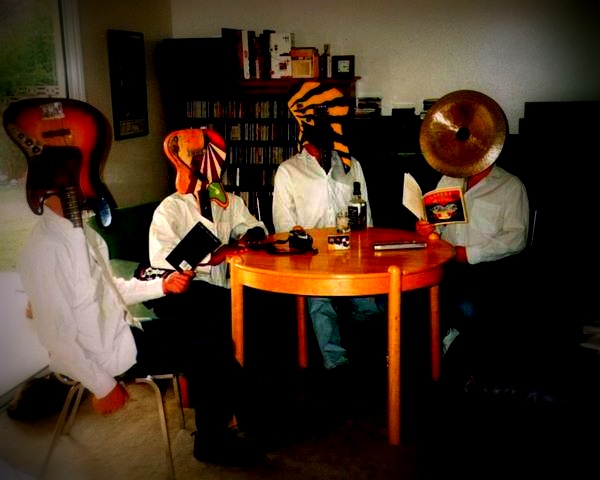
With 30 years of making music together and 17 studio releases behind them, the members of Djam Karet have much to be proud of. The band has received outstanding reviews from the music press and respect from great musicians all over the world, but still operate on the remote fringes of popularity – pretty much by choice. This lack of willingness to compromise their vision has earned them a unique place in the world of instrumental progressive rock. Exposé was able to catch up with several members of this enigmatic ensemble following the release of their latest studio album.
by Peter Thelen, Published 2014-06-08
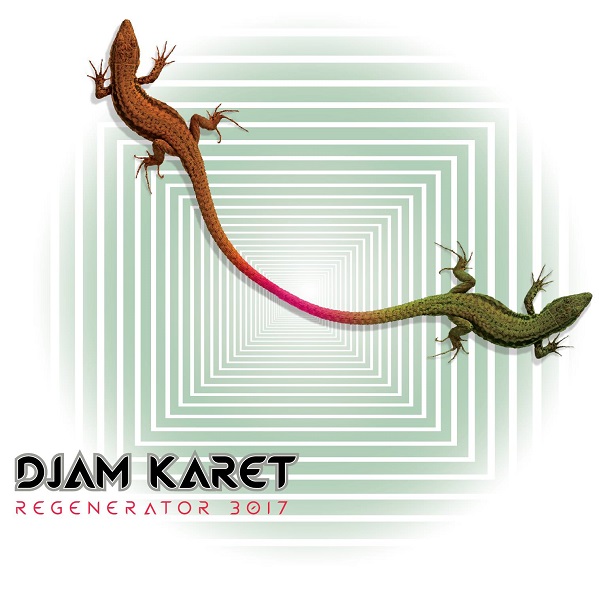 With Regenerator 3017 being your 30th anniversary album, what was the band trying to achieve with this release?
With Regenerator 3017 being your 30th anniversary album, what was the band trying to achieve with this release?
Gayle Ellett: Speaking for myself, I was trying to create an album that had many of the qualities of the classic albums I grew up listening to, as a kid back in the 70s. Not their "sound" or style, but the same amount of dedication, vision, and quality of some of those older 70s albums. I wanted this album to be a lot more melodic, more beautiful and laid-back, without the usual bombast that is present on some of our albums. A few years ago I bought a '79 Rhodes and I'd been playing it a lot recently. I was also listening to a bunch of old albums by Hatfield and the North, National Health, Soft Machine, etc. And I wanted to make a coherent, confident, focused, mellow and melodic album... even if it doesn't jump out at you, and even if it is too mellow for some of our fans. We make the music for ourselves, not for our fans, so if we are happy with it... then we have achieved our goals. And we are all quite happy with how the album turned out. Its amazing what endless amounts of hard work can achieve!
Henry Osborne: I don't recall any big discussions about a grand vision for the release. Perhaps Gayle and Chuck had these. One seemingly common desire among us was to edit the length of tunes to make them concise musical statements. This concept held true for the album as a whole, hence, its relative brevity compared to most other DK releases. My desire was to infuse the gritty DK rock sound with more elements of jazz than had been heard in the past. As part of this I wanted the bass to be recorded and mastered without much in the way of effects. Gayle did a real nice job of getting a fat but not overly compressed bass tone.
Chuck Oken Jr: I do not think we are ever real clear going into rehearsing and recording exactly what we are going to do. We tend to let the music and the time guide us. In this case, we knew we wanted to do something different from The Trip. Doing The Trip 2 was too easy. Getting in and trying to record the best record possible was an overall guiding force and Gayle gets a lot of credit for pushing us with recording techniques and in his mixing. We also went into this recording with Henry Osborne, instead of Aaron Kenyon, on bass for this record. Henry was available and we had not played together for years and so his presence was going to give this body of music a different feel.
Mike Murray: Gayle and Chuck said they wanted to make a melodic, fusion-influenced record. I contributed elements to compliment a straight ahead approachable sound that this record exemplifies, but without sounding derivative or over-wrought. On "Prince of the Inland Empire," for example, I played a more laid back soul-style on the rhythm, while on others tracks the delay and reverb was laid on thick to fill the spaces with shimmer. We didn’t setup one sound and press record. It makes for a more dynamic listening experience.
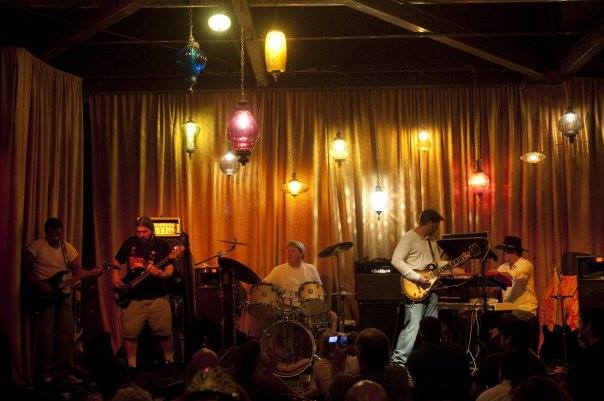 One thing that struck me, after a couple dozen listens in preparation for the review I wrote, was that on the band's early releases the music was clearly divided between edgy rock and more floating ambient and experimental material, even to the point where the different styles were placed on separate releases. With R-3017 the two styles seem to have converged into a single more unified sound that encompasses everything that the band is about, and at the same time reached out into some new funkier and jazzy areas as well. Please comment.
One thing that struck me, after a couple dozen listens in preparation for the review I wrote, was that on the band's early releases the music was clearly divided between edgy rock and more floating ambient and experimental material, even to the point where the different styles were placed on separate releases. With R-3017 the two styles seem to have converged into a single more unified sound that encompasses everything that the band is about, and at the same time reached out into some new funkier and jazzy areas as well. Please comment.
CO: You listen well is my first comment! All of the tunes were written and recorded as a three-piece by Gayle, myself, and Henry. Lots of spaces were left for solos and melodies and those were put on by Gayle, Mike, and Mike, and then some textures were added by Henry, Gayle and myself. We knew from the original three-piece recordings which direction the record was going and that was in a bringing together of the elements of our sound instead of an exploration or deconstruction of them.
HO: This is best answered by Gayle and Chuck but from my perspective it seemed natural to include elements of both sounds on this 30th anniversary release. However, I also know that there was a conscious decision made to not include on Regenerator some of the more electronic pieces we worked up.
GE: Your observation is correct. We usually change things up from album to album, so that we remain interested and motivated. So it is typical for each album to be a bit different from the others. On Regenerator 3017 we wanted to make something different from our previous album, the other-worldly The Trip. And I also wanted this release to encompass much of our over-all sound. It is our 30th anniversary together, and we wanted to make an album that was appropriate for the occasion! Hopefully, we have succeeded.
MM: For me, working with Henry was what defined that convergence. I’d only played with Aaron, who has a technical, yet aggressive approach – almost metal, which tapped into my punk rock sensibility. Henry has more of a traditional jazz style, which having only played with him on this record, made me tone down the noise-scapes and work out more precise phrasing.
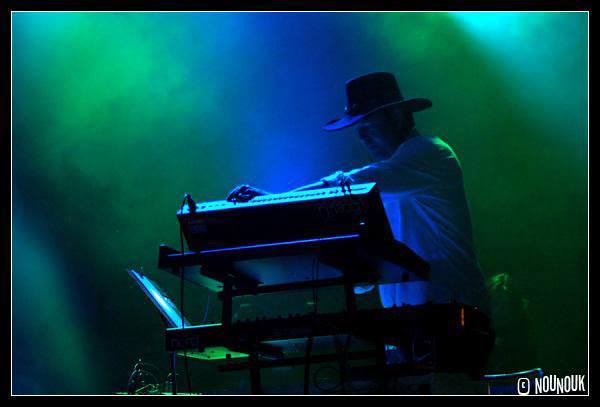 Questions for Gayle: In recent releases you've been contributing more keyboards than guitar to the band's releases, and it seems to be a major contribution to the diversity of the band's current sound, whereas in the earlier days you were one of two guitarists. How did that evolution from guitar to keyboards come about? Have you always played keys?
Questions for Gayle: In recent releases you've been contributing more keyboards than guitar to the band's releases, and it seems to be a major contribution to the diversity of the band's current sound, whereas in the earlier days you were one of two guitarists. How did that evolution from guitar to keyboards come about? Have you always played keys?
GE: I've been playing guitar for over 40 years, but I've been playing keyboards for almost 50 years now. And for many decades I've also played a wide array of World instruments too. Currently I play in five different bands, for example I play lead guitar in a blues band, and I play whatever instrument is needed by the group. But I see myself more as a guitar player then a keyboardist. The guitar is a more expressive instrument. Though I play most of the keyboards on Regenerator 3017, I also play about half of the guitar solos as well. On The Trip and also on The Heavy Soul Sessions, I just played keyboards, because both were recorded live-in-studio without overdubs. And to get a more full sound, we brought in Mike Murray to add guitar, and I just played keyboards. But in reality I play guitar a lot of the time, it all just depends on what is needed for the project at that moment.
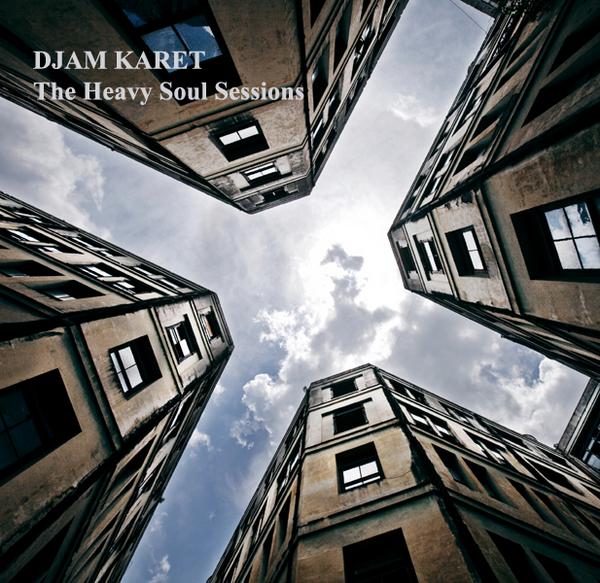 Question for Mike: Since The Heavy Soul Sessions, you’ve been contributing guitar on the albums, and with The Trip it seems like you’re now a full member. What is your background prior to Djam Karet?
Question for Mike: Since The Heavy Soul Sessions, you’ve been contributing guitar on the albums, and with The Trip it seems like you’re now a full member. What is your background prior to Djam Karet?
MM: Prior to Djam Karet, I was in mostly in art/indie and post punk bands. My initial inspirations were primarily early British metal and art rock players like Ritchie Blackmore and Bill Nelson. Although I was exposed to early progressive music through my older brother, it’s not why I picked up the guitar. As I became more immersed in playing, I was getting into early jazz players like Charlie Christian and Django Reinhardt while still playing bombastic, yet dreamy college radio music, with vocals. I met Gayle through our circle of Topanga friends and he asked me to play on an acoustic project he was working on at the time. DK was slotted to headline a festival in France and since he was moving to keys, he asked if I was up for taking over for him on guitar. He knows I’m not really a geeked-out technical player, but I think he heard my voicing and phrasing abilities and knew I’d make up for it with a sound and style that was more suited to Djam Karet. I also get to design the covers, so I visually get to enhance the vibe of the records too.
GE: A few years ago when we were invited to headline the three-day progressive Crescendo Festival, held on the beach in Southern France... we wanted to sound impressive, so we decided to perform as a five-piece. So we needed another musician, and finding guitar players is a lot easier than finding good keyboardists – here in Los Angeles everyone is a guitar player! So we brought in Mike. He had played with me previously in some live shows of my world music group Fernwood, so I knew he was up to the task! And we've kept him on ever since! It's a great fit.
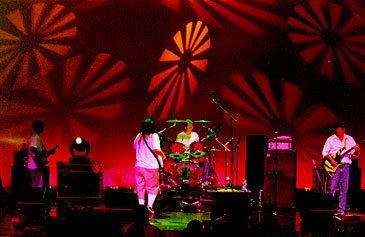 Djam Karet has always received outstanding reviews in publications like Guitar Player, Rolling Stone, Billboard, AAJ, Electronic Musician, and so on... even in the early years going back to the Reflections from the Firepool days. But the band still soldiers on on the fringes of popularity, known mostly to hard core music geeks and critics. Do you agree with that assessment, and why do you think that is? Do you think it's the lack of vocals?
Djam Karet has always received outstanding reviews in publications like Guitar Player, Rolling Stone, Billboard, AAJ, Electronic Musician, and so on... even in the early years going back to the Reflections from the Firepool days. But the band still soldiers on on the fringes of popularity, known mostly to hard core music geeks and critics. Do you agree with that assessment, and why do you think that is? Do you think it's the lack of vocals?
CO: Absolutely agree with that assessment. There are reasons for this. This is instrumental music with no vocals. It has a limited audience. We have no management and rarely perform live by choice. No one is pushing us and there are a million bands screaming on Facebook. We are "artists" with our own musical vision and put out releases we truly believe in with no expectations of sales or reviews. I do wish somehow, as every artist does, that we could get greater exposure in folks hearing our music because given a chance, they just may like it.
HO: The lack of vocals certainly could be a contributing factor to the band’s limited appeal. Much of our material also has an unsettling quality to the ears of many. The biggest reason for our lack of notoriety I believe is the absence of continuous tour support and live shows promoting our music. The reality for most of us over the years has been that we have professional and family obligations which make touring or even frequent local live performances really tough to do. This may not be a very romantic explanation for our lack of broader appeal, but it’s the one that has come to my mind most often over the years.
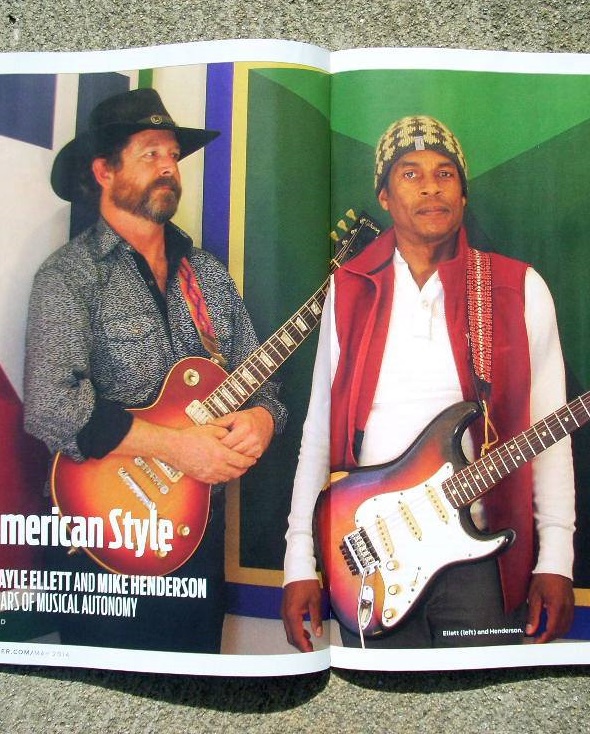 GE: To me, music with vocals is like a movie with narration... but a good movie doesn't need narration! Vocals are much too literal, and are often the weakest part of a band's sound – in my totally biased opinion. So most of the albums I own are instrumental. Strangely, its our non-conformist approach itself that has gathered us some fans! The more we abandon popularity, the more the press/critics seems to like us. I play in numerous professional bands, and a few party bands... but I also make commercial music for TV and film. On those commercial projects it is very important to make sure that people in general, and the producer/director in particular, really like the music... it doesn't matter if to me the music is boring, because they pay me. But, speaking for myself, with Djam Karet I have no interest in making music that other people will like. I am only interested in seeing if we can create that great sound that we want to hear. So I don't really care about pleasing our fans, or making new ones. We are not trying to be "impressive" or to "wow" people. We have too much confidence for that, we don't care. The album itself is the goal, not its popularity. So I would say that we are not less popular than I would have thought we'd be. And, in fact, it's actually rather surprising that we are as popular as we are, given that fact that we don't chase our fan-base! Everything is difficult when it comes to music, and it helps to have a focus. And you should decide if your goal is to be artistic, or commercial – but don’t try to be both: you'll fail, unless you are the Beatles. And our focus is on making music as an art-form, where we apply the concept of theme and variation to different aspects of our music. Any change that you make to become more popular is a bad idea, because you are moving away from where you want to be, in the lame hope that more fans will make up for this damaging change in direction. But we are unwavering, and forever non-commercial, and we are a better band for taking this uncompromising position.
GE: To me, music with vocals is like a movie with narration... but a good movie doesn't need narration! Vocals are much too literal, and are often the weakest part of a band's sound – in my totally biased opinion. So most of the albums I own are instrumental. Strangely, its our non-conformist approach itself that has gathered us some fans! The more we abandon popularity, the more the press/critics seems to like us. I play in numerous professional bands, and a few party bands... but I also make commercial music for TV and film. On those commercial projects it is very important to make sure that people in general, and the producer/director in particular, really like the music... it doesn't matter if to me the music is boring, because they pay me. But, speaking for myself, with Djam Karet I have no interest in making music that other people will like. I am only interested in seeing if we can create that great sound that we want to hear. So I don't really care about pleasing our fans, or making new ones. We are not trying to be "impressive" or to "wow" people. We have too much confidence for that, we don't care. The album itself is the goal, not its popularity. So I would say that we are not less popular than I would have thought we'd be. And, in fact, it's actually rather surprising that we are as popular as we are, given that fact that we don't chase our fan-base! Everything is difficult when it comes to music, and it helps to have a focus. And you should decide if your goal is to be artistic, or commercial – but don’t try to be both: you'll fail, unless you are the Beatles. And our focus is on making music as an art-form, where we apply the concept of theme and variation to different aspects of our music. Any change that you make to become more popular is a bad idea, because you are moving away from where you want to be, in the lame hope that more fans will make up for this damaging change in direction. But we are unwavering, and forever non-commercial, and we are a better band for taking this uncompromising position.
MM: True, DK is a band that lives in the outer weeds of notoriety, but still has a devoted following. I agree most people like to hear singing – it’s the first point of identification that they can relate to in music. It’d be great to be appreciated by more people, but being into musical esoterica myself, I like that this music stays fresh, mysterious an open to interpretation. Yeah, no one chases us down for autographs, but we don’t have to make apologies either.
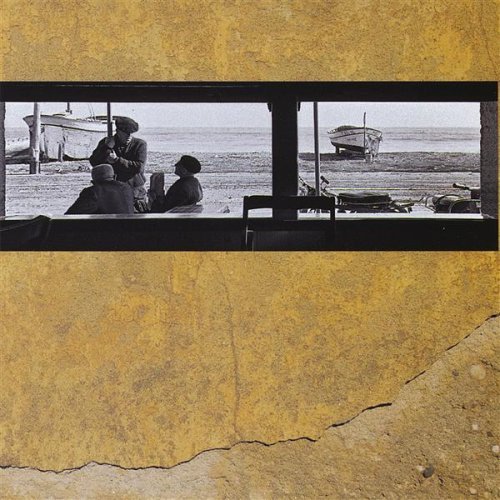 Gayle, You produced two Fernwood recordings, with all wooden acoustic instruments - both were well liked by the crew at Exposé. Give some backround on that project, and will there be any more?
Gayle, You produced two Fernwood recordings, with all wooden acoustic instruments - both were well liked by the crew at Exposé. Give some backround on that project, and will there be any more?
GE: Fernwood is an instrumental acoustic World/Americana group I have with my pal Todd Montgomery. Todd is a master sitar player, and a great all around multi-instrumentalist. Our past two albums have done really well, and our CD Almeria was "#4 Album of the Year" on Echoes Radio! And with all of the great reviews we have received, we've accomplished quite a lot. Currently we are mixing the third album, and its been a few years in the making. Our slogan is "All music played by hand, on instruments made out of wood," and we are keeping that philosophy on our third album that we are making now. This new album has more of a cinematic and soundtracky vibe, due to all of the film and TV work I do. The focus is always on orchestration and arrangements, not on soloing or fancy techniques. There is no album title yet, but the album is gonna be great. I am super proud of the music we have created in Fernwood! And the new album will be our best yet. Of the seven bands I currently play in, the two best groups, by far, are Djam Karet and Fernwood. So I am pretty lucky!
The Ukab Maerd collaboration with Richard Pinhas was another excellent side project. How did that come about, and was it recorded live, or long distance?
GE: Chuck really spear-headed that project, and he can explain it the best. But I will say that all of the really cool parts are played by me – and not Chuck... Just kidding! Its a great album and Chuck is the one most responsible for that, and yes, much of it was recorded live.
CO: The Ukab Maerd release is a series of live performances that Gayle and I did. You then take many hours of music and pull out what you feel are the better parts and pull something together – like painting! It is very important to me not to overdub on top of what is there. The music may get treated, effected, looped, etc. but solos and all remain as they are. Richard had given us some guitar spheres on CD at one point and we kept threatening to use them and this became the project for it as he became "the voice"/ presence of The Waiting Room.
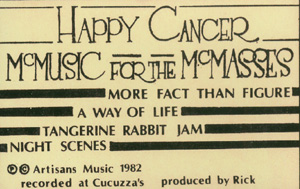 Chuck, please tell our readers about the improvisational performances that led to the Dream Theory in the IE release a couple years ago featuring yourself and Mike Henderson. Are you guys still doing those types of events?
Chuck, please tell our readers about the improvisational performances that led to the Dream Theory in the IE release a couple years ago featuring yourself and Mike Henderson. Are you guys still doing those types of events?
CO: We are currently not doing any of these events but there is some discussion on the table for the fall. Dream Theory was a direct outgrowth of my work with Gayle and Ukab Maerd. Between both releases, I was able to work with DK members one on one in an improvisational setting that we are all quite comfortable with. The core of this band is in our shared musical language over the years and these two projects gave us the ability to stretch and return to the space where we came from.
Three years before the first Djam Karet tape No Commercial Potential, there was a pre-Djam Karet band called Happy Cancer, and a tape release McMusic for the McMasses. Was Djam Karet a direct evolution from that band, or did the DK members split off and go their own way? Please reminisce on those early days.
CO: Absolutely a direct evolution from that band with a change of players. Happy Cancer was our college days that were full of exploration of all things. Very Gong-like in nature, Kesey California in spirit and even some experimental vocal tracks. For me, the evolution of HC to DK has been one long trip!
HO: During the interim, Chuck and another founding member of Happy Cancer, John Glass (guitars), as well as myself were part of a kinda New Wave band called Vox Populi. We put out a single and played a few L.A. club dates neither of which garnered much attention. After Chuck left V.P. John and I continued to write tunes together for a short while. Overall, I'd say that Djam Karet was a pretty clear outgrowth of Happy Cancer, but with more of an improvisational spirit as documented on No Commercial Potential.
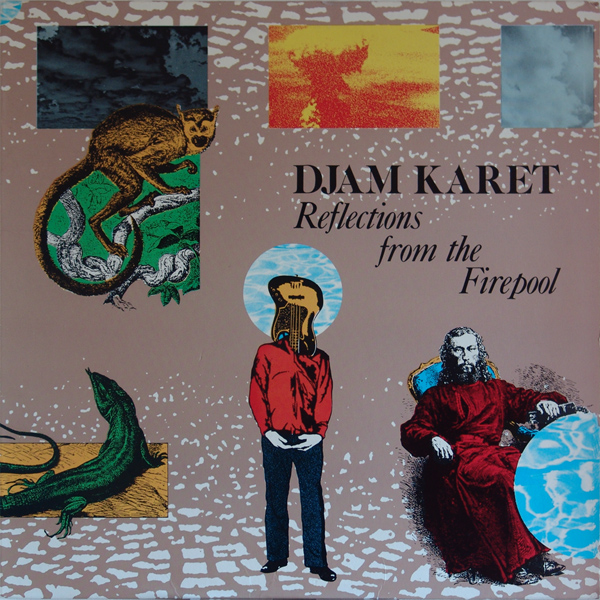 I'm sure that everyone agrees that the latest album Regenerator 3017 is the greatest to date, but I would like each of you to share your particular favorites from the Djam Karet back catalog, and the reasons why they are your favorites.
I'm sure that everyone agrees that the latest album Regenerator 3017 is the greatest to date, but I would like each of you to share your particular favorites from the Djam Karet back catalog, and the reasons why they are your favorites.
HO: I tend to be sentimental about the first couple of releases including Reflections from the Firepool, Collaborator, and Burning the Hard City. I know that sonically later releases tend to be better sounding, but the energy, enthusiasm, sense of discovery, and camaraderie of the first few discs is hard to beat. We tended to write and record more as a band back then, and even did some of the mixing as an ensemble. This led to a closeness not really seen since – it also led to more than a few nasty disagreements! Even The Devouring has a special place within me because it was such a weird and difficult time for the band and some of us personally. I was honored to again work with Chuck and Gayle on Regenerator 3017 and am immensely happy with the end result.
CO: "Technology & Industry" from The Ritual Continues. Loved the drive and aggression of the tune and the KC-like power. "Reflections from the Firepool" from RftF. This was a big release for us as CDs were just starting to catch on. Recorded and mixed in the old Packing House this tune had wonderful changes and train sounds and microphone squeaks and it started us really exploring. Burning the Hard City and Suspension & Displacement – entire releases. One album of intense Crimson jazz rock and early Genesis "Knife" energy and one album of Fripp/Sylvain dreamscapes. I love both of these releases – they are so intense and extreme. Some of our most driving and difficult music and a blast to record. "Web of Medea" from New Dark Age. The beginning of the post 2000 DK sound which featured retro sounds and just some gorgeous melodies from Gayle and Mike H over slower moving terrain. Hello Pink Floyd! Ascension – entire release. Gorgeous record and the real introduction of acoustic instruments and twisted electronics. "Hungry Ghost" from A Night for Baku. Aaron K is just a monster bass player and here we really get into the whole Magma Zeuhl groove and the point where the dual guitar lines come in and we are moving! The Trip – I’m so glad that folks got it and enjoyed it as much as we did making it. Mr Ellett plays a mean Moog and Rhodes and every time I hear it I am thinking of Pink Floyd Live at Pompeii.
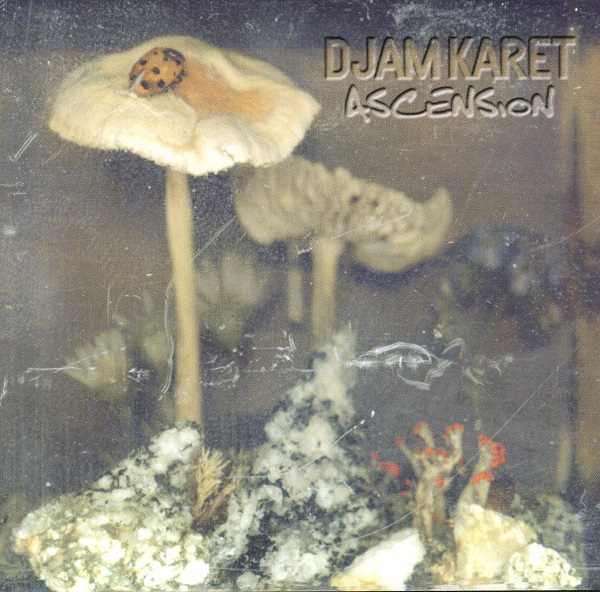 GE: I think that Ascension is one of my favorites. Some of the music is quite melodic. And also The Trip was a really bold and completely crazy move that totally paid off! Making an album that contains just one really long tune – 47 minutes – is basically insane! And its probably asking too much of our fans to sit there and listen to the whole thing. But heck, we are not here to make easy-listening music! That's for the other bands to do. But we are here to make the music that the members of our band, Djam Karet, really like. That's it, period. So we don't even care if you like it or not. We do not ever compromise our vision in order to make music that other people might like. We will not move an inch towards what people would like to hear, we only make music for ourselves. And I think that The Trip really encompasses, and shows off, that crazy non-compromising vision. If no one ever bought our CDs, we would still make recorded music, because that is the goal: to make albums that hopefully have the same amount of creative vision that the classic albums we all grew up with had. But if no one bought our CDs we would just not bother to mass-produce them and release it for sale, the music would stay in-studio. But our goal remains to try to make a great visionary album, like the classics we all grew up listening to.
GE: I think that Ascension is one of my favorites. Some of the music is quite melodic. And also The Trip was a really bold and completely crazy move that totally paid off! Making an album that contains just one really long tune – 47 minutes – is basically insane! And its probably asking too much of our fans to sit there and listen to the whole thing. But heck, we are not here to make easy-listening music! That's for the other bands to do. But we are here to make the music that the members of our band, Djam Karet, really like. That's it, period. So we don't even care if you like it or not. We do not ever compromise our vision in order to make music that other people might like. We will not move an inch towards what people would like to hear, we only make music for ourselves. And I think that The Trip really encompasses, and shows off, that crazy non-compromising vision. If no one ever bought our CDs, we would still make recorded music, because that is the goal: to make albums that hopefully have the same amount of creative vision that the classic albums we all grew up with had. But if no one bought our CDs we would just not bother to mass-produce them and release it for sale, the music would stay in-studio. But our goal remains to try to make a great visionary album, like the classics we all grew up listening to.
If there are any other things you want to share, future side projects and collaborations, our readers would surely like to hear about it.
GE: Chuck and I have released the debut Spoke of Shadows album on our private label Firepool Records, and it's a great album that we are all quite proud of. Who knows what the future will bring? Well, I do... it's going to bring us more music! Thank you for giving us such great exposure throughout the years, and many thanks to the readers of Exposé for supporting our unique vision! We all really appreciate it!
CO: Just want to thank all of you who have listened or who are discovering our music. Thank you for your heads!
Filed under: Interviews
Related artist(s): Fernwood, Djam Karet, Chuck Oken, Ukab Maerd, Gayle Ellett
What's new
These are the most recent changes made to artists, releases, and articles.
- Review: Exit - Dove Va la Tua Strada?
Published 2026-03-01 - Review: Steve Tibbetts - Close
Published 2026-02-28 - Release: We Stood Like Kings - Pinocchio
Updated 2026-02-27 19:24:02 - Release: Stephen Grew - Pianoply
Updated 2026-02-27 19:20:11 - Release: Thierry Zaboitzeff - Artefacts
Updated 2026-02-27 00:16:46 - Review: Kevin Kastning - Codex I & Codex II
Published 2026-02-27 - Release: Zan Zone - The Rock Is Still Rollin'
Updated 2026-02-26 23:26:09 - Release: The Leemoo Gang - A Family Business
Updated 2026-02-26 23:07:29 - Release: Ciolkowska - Bomba Nastoyashchego
Updated 2026-02-26 13:08:55 - Review: Immensity Crumb - Chamber Music for Sleeping Giants
Published 2026-02-26 - Release: The Gatekeepers - Diary of a Teenage Prophet
Updated 2026-02-25 15:55:58 - Listen and discover: Mordecai Smyth will not break your back
Published 2026-02-25 - Review: Mars Lasar - Grand Canyon
Published 2026-02-25 - Release: Tashi Wada - What Is Not Strange?
Updated 2026-02-24 14:56:16 - Artist: Tashi Wada
Updated 2026-02-24 14:54:34 - Release: Greg Segal - Maintain!
Updated 2026-02-24 00:38:03 - Review: Il Segno del Comando - Sublimazione - Live
Published 2026-02-24 - Review: Nektar - Mission to Mars & Fortyfied
Published 2026-02-23
